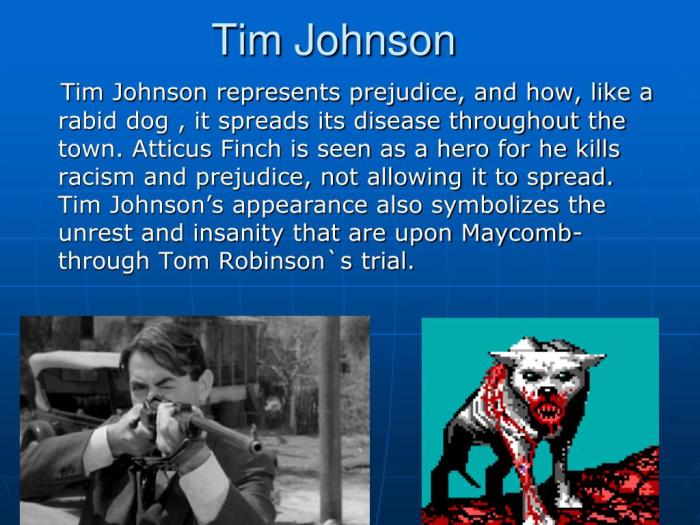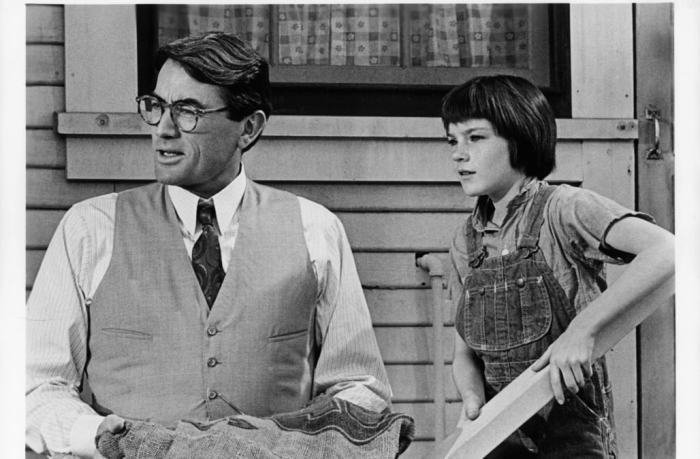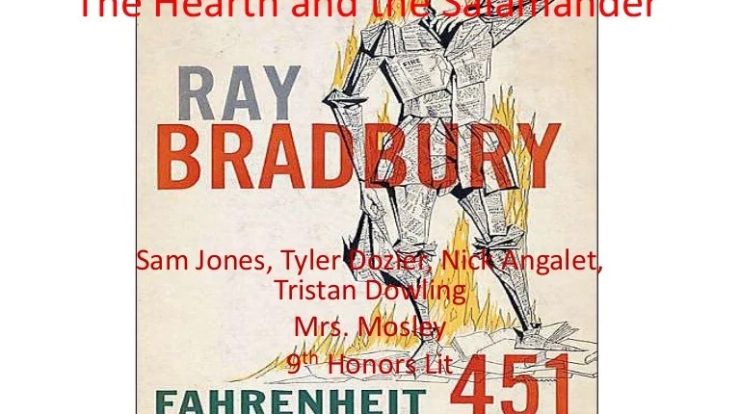To kill a mockingbird tim johnson – In Harper Lee’s seminal novel “To Kill a Mockingbird,” Tom Johnson stands as a pivotal character whose trial and legacy continue to resonate in both literary and social discourse. His characterization, the trial’s legal and ethical implications, and the enduring impact of his story on American society warrant in-depth examination.
Tom Johnson’s multifaceted character embodies the complexities of human nature, prejudice, and the pursuit of justice. As the accused in a racially charged trial, he represents the systemic injustices prevalent in the American South during the Jim Crow era.
Character Analysis of Tom Johnson

Tom Johnson is a central character in Harper Lee’s “To Kill a Mockingbird.” He is a young African American man who is falsely accused of raping a white woman named Mayella Ewell. Johnson’s character serves as a powerful indictment of the racism and prejudice that were prevalent in the American South during the 1930s.
Motivations, Actions, and Relationships
Johnson is a kind and gentle man who is falsely accused of a crime he did not commit. He is motivated by a desire to protect his family and community from the racism and violence that they face. Johnson’s actions are always guided by his conscience, and he is willing to risk his own life to stand up for what he believes in.
Symbolism and Significance, To kill a mockingbird tim johnson
Johnson’s name and appearance are both significant. His name, Tom, is a common name for African American men in the American South. This suggests that Johnson is a representative of all African Americans who have been unjustly accused of crimes.
Johnson’s appearance is also significant. He is a large, powerful man, which suggests that he is capable of defending himself and his community from harm.
The Trial of Tom Johnson: To Kill A Mockingbird Tim Johnson
Johnson’s trial is a pivotal moment in the novel. The trial is a miscarriage of justice, and it highlights the racism and prejudice that are prevalent in the American South. The evidence against Johnson is weak, and the jury is all-white.
The jury finds Johnson guilty, and he is sentenced to death.
Legal and Ethical Implications
Johnson’s trial raises a number of legal and ethical issues. The trial is a violation of Johnson’s due process rights. The jury is not impartial, and the evidence against Johnson is weak. The verdict is a miscarriage of justice.
Prejudice and Racism
The trial of Tom Johnson is a clear example of how prejudice and racism can lead to a miscarriage of justice. The jury is all-white, and they are unable to see Johnson as anything other than a criminal. The verdict is a reflection of the racism that is prevalent in the American South.
Tom Johnson’s Legacy

Johnson’s trial has a profound impact on the characters in the novel. Atticus Finch, Johnson’s lawyer, is disillusioned by the verdict. He realizes that the American South is not yet ready for racial equality. Johnson’s death also has a profound impact on Scout Finch, Atticus’s daughter.
Scout learns that the world is not always fair, and that there is still much work to be done to achieve racial equality.
Contemporary Society
Johnson’s legacy continues to resonate in contemporary society. His trial is a reminder of the racism and prejudice that still exist in the world today. Johnson’s story is a reminder that we must continue to fight for justice and equality.
Comparative Analysis of Tom Johnson and Other Characters
Johnson can be compared and contrasted with a number of other characters in the novel, including Atticus Finch, Bob Ewell, and Boo Radley.
| Character | Key Traits | Motivations |
|---|---|---|
| Tom Johnson | – Kind and gentle
|
– Protect his family and community
|
| Atticus Finch | – Intelligent and compassionate
|
– Protect his children
|
| Bob Ewell | – Racist and violent
|
– Hate African Americans
|
| Boo Radley | – Mysterious and reclusive
|
– Protect his family
|
Tom Johnson in Film and Television Adaptations
Johnson has been portrayed in a number of film and television adaptations of “To Kill a Mockingbird.” The most notable adaptations include:
- The 1962 film adaptation, directed by Robert Mulligan, starring Gregory Peck as Atticus Finch and Brock Peters as Tom Johnson.
- The 1988 television adaptation, directed by Alan Parker, starring James Garner as Atticus Finch and Morgan Freeman as Tom Johnson.
- The 2015 Broadway play adaptation, directed by Bartlett Sher, starring Jeff Daniels as Atticus Finch and Colman Domingo as Tom Johnson.
The portrayal of Johnson in these adaptations has evolved over time. In the 1962 film adaptation, Johnson is portrayed as a stereotypical African American man. In the 1988 television adaptation, Johnson is portrayed as a more complex and sympathetic character.
In the 2015 Broadway play adaptation, Johnson is portrayed as a strong and dignified man.
These adaptations have had a significant impact on the public’s understanding of Johnson’s character and the novel’s themes. The adaptations have helped to bring the novel to a wider audience, and they have helped to raise awareness of the racism and prejudice that still exist in the world today.
Common Queries
Who is Tom Johnson in “To Kill a Mockingbird”?
Tom Johnson is a black man accused of raping a white woman in the novel “To Kill a Mockingbird.”
What is the significance of Tom Johnson’s trial?
Tom Johnson’s trial highlights the racial prejudice and legal inequality faced by African Americans in the American South during the Jim Crow era.
How does Tom Johnson’s character contribute to the novel’s themes?
Tom Johnson’s character explores themes of racial injustice, morality, and the nature of justice in the novel.
